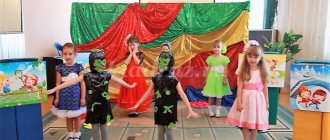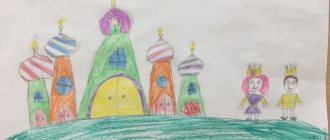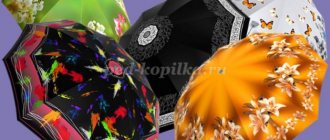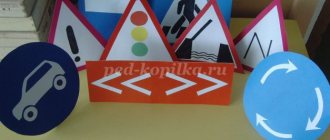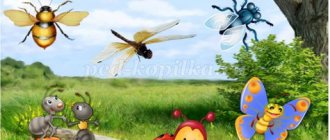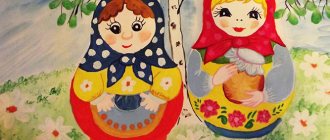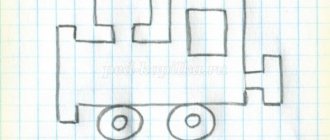Types of conversations in the preparatory group, card files
Conversations with children aged 6–7 years are varied not only in topic, but also in type. In other words, in the preparatory group the teacher organizes conversations of all types, practiced in kindergarten. And, as last year, special attention is paid to educational and ethical conversations.
In the preparatory group, conversations on educational and ethical topics predominate
Table: examples of cognitive and ethical conversations in the preparatory group
Author - Vasylishin N.A., teacher of kindergarten, school-gymnasium No. 60, Lugansk.
- systematize knowledge of traffic rules for pedestrians;
- make sure there is a danger of playing on the roadway.
- There are a lot of traffic rules in the world. It wouldn’t hurt us to learn them all, But the main thing from the Rules of Movement is to know how to do the multiplication tables. Don't play on the pavement, don't ride, if you want to stay healthy!
Children play the game "Scooter". To the rhythm of the rhyme, bend one leg at the knee, imitate the push-off movement with the other leg, sliding it along the floor:
- Scooter! Scooter! Scooter, very happy! I roll it myself, I roll the scooter myself wherever I want!
After which the children answer the questions:
- “Why is it dangerous to play on the pavement?”;
- “Where can I skate, ski, scooter?” and etc.
- to form an idea of man as a rational being, who is at the same time a part of nature;
- involve in research activities;
- develop monologue and dialogic speech;
- stimulate a creative view of the world.
- cultivate respect for bread and people whose professions are related to bread production;
- Learn to write a story using pictures.
- Soft, fluffy and fragrant. It is black and white, and sometimes burnt... (bread).
The teacher asks what kind of bread there is. Children answer that it is white, black, soft, stale, etc. An adult talks about the technology of bread production. Children, selecting illustrations in an appropriate order, summarize the stages of this process. The game “Who is more”: the teacher throws a ball to the children, they name any baked product. Physical education minute:
- A grain fell into the ground (squat down) It began to sprout in the sun (hands above your head) The rain watered the ground, and the sprout grew (slowly stand up) It reached out to the light and warmth And turned into a handsome man.
Children make up one sentence each with the name of any baked product. Bottom line: bread is the boss of everything.
- systematize the idea of vegetables and their importance for the human body;
- find out which animals help grow a good harvest.
- “Where do vegetables grow?”;
- “What are the people who grow vegetables called?”;
- “Why grow vegetables?”;
- “In what form can you eat vegetables?”
The teacher asks the children to lay out the vegetables on two mats: one is black, on it we need to put those vegetables from which we eat the roots, and the second is green, on it we need to place those crops from which we eat the tops. The teacher asks to name animals that are good for vegetables. Children look at the pictures and comment on the illustrations:
- moles and worms dig the ground, and the roots breathe;
- frogs eat slugs that spoil cabbage.
Summary of the conversation: vegetables are very useful, but to grow them you need to put in a lot of work.
- formation of a collective image of the mother;
- foster the need to assist mothers in daily activities.
- Who loves you kids dearly? Who will love you kids? Without closing your eyes at night, does everything take care of you? She is still dear, dear mother.
Then the teacher asks the kids to tell about their mother: what the child feels for his mother, what words he says to her. The teacher turns to the children for an explanation of the concept of “golden hands” and asks them to tell how kids help their mothers around the house. Then the teacher organizes a ball game “How I Help Mom”: he throws the ball to the children one by one, they catch it and say how they are helping. Bottom line: the family rests on the mother, the children should help her.
- expand the understanding of the concept of family;
- clarify knowledge of family relationships;
- develop the skill of evaluating one’s own actions and the actions of other people.
- Family - this word will tell us a lot. The family will show us the path of life from birth. And every moment, no matter what the moment with her, there are no more magical, dearer moments. Family is with us always and everywhere. It means a lot in every life.
After that, the children play the “Family” lotto: everyone receives cards with a picture of mom, dad, grandmother, etc. Then, one by one, they take a small card out of the box with an illustration of an activity and place it next to their relatives in order. For example, “Grandfather and I are making dumplings.” If this was not the case, the small card must be returned to the box. The one who closes all the cards wins. Children define the concept of family, remember proverbs and sayings on the topic. The teacher tells the fairy tale “The Family of Wizards”: “In one ordinary family of wizards, something incredible happened: the boy Vasya stopped obeying his mother, who asked him to clean his running boots. Then mom announced that she would not listen to dad: he would come home from work and ask to lay out a self-assembled tablecloth, and mom would say that she had taken it to the dry cleaner. Dad heard this and announced that he, too, was now no longer listening to grandfather: he would tell dad to clean the flying carpet of dust, and dad would refuse him. And grandfather also did not remain in debt: he says, they say, that’s it, I will no longer obey my grandmother: water her magic apple tree or feed her goldfish. The grandmother looked at Vasya and declared that she would no longer obey him and would not tie the invisibility cap. Vasya thought and thought and decided that he had to obey his mother, then the others would help each other. So they will have a magical family.” The teacher asks the children if they have magical families. Bottom line: family is love, care and respect.
- systematize the concepts of “friend”, “friendship”;
- learn to understand and evaluate the actions of other people;
- develop communication skills;
- cultivate responsiveness.
- “How do you understand what friendship is?”;
- “By what qualities do you choose friends?”;
- “What should I do to have more friends?”;
- “Who would you never make friends with?”;
- “Can moms and dads be your friends?”
Children remember proverbs about friendship, and then select pictures that match the content of the stories “Three Comrades” by V. Oseeva, “Childhood Friend”, “Friends Known in Trouble” by V. Dragunsky. The teacher offers to play the game “Living Pictures”: one mini-group receives a picture and uses gestures and facial expressions to describe what is happening on it. The second mini-group tries to describe their pantomime in words. The conversation ends with the game “Caterpillar”: children with balls stand in a column one at a time, holding the ball between their stomach and the back of the comrade in front. Thus, to the song “If you went on a journey with a friend,” the children move around the room. A teacher with children sums it up: friends need to be protected.
- systematize knowledge of the rules for handling books;
- cultivate respect for printed publications.
- do not tear;
- do not wrinkle;
- do not paint;
- care.
Dunno realizes that he behaved incorrectly and invites the children to paste in a page to finish reading the story. The teacher finishes reading and sums it up together with the children: books must be taken care of.
This is interesting. The content of cognitive and ethical conversations in the preparatory group is closely intertwined, since the age of the children allows us to consider a particular problem from different angles, touching on both one and the other area.
The topics of educational and ethical conversations in the preparatory group are closely intertwined
On the topic: methodological developments, presentations and notes
Card file of conversations for the preparatory group (September-May).
To form preschoolers’ ideas about safety on the streets and roads. Convince children of the dangers of playing on the roadway (road). Explain why you can’t play on the streets.
Conversations for the preparatory group.
Card index of thematic conversations for the preparatory group. Educator: Elena Sergeevna Chubarova, 2022.
A file of conversations in a pre-school group for every day. The conversations are divided into topics: “Family”, “Native country, hometown”, “Socio-moral education, etiquette.
Material for conducting conversations on the topic “Winter” in the preparatory group.
